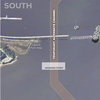A U.S. Navy court of inquiry into the submarine-trawler collision off Hawaii in which nine Japanese were killed has recommended measures that would probably end the submarine commander's career but would spare him a court martial, a Navy official said on Sunday.
The official said that the recommendations, if implemented, meant Cmdr. Scott Waddle would "be out of the Navy, but at least he won't be in jail."
The Navy official said the panel's recommendations would also spare the other two officers charged in the accident, Lt. Cmdr. Gerald Pfeifer and Lt. Michael Coen, from court martial.
The 2,000-page report by the court of inquiry, composed of three Navy admirals, was delivered to Pacific Fleet Commander Admiral Thomas Fargo on Friday, and it is up to Fargo to decide what action to take, if any, within 30 days.
Nine Japanese men and teenage boys were killed when the nuclear attack submarine USS Greeneville rammed the Japanese trawler Ehime Maru off the island of Oahu on Feb. 9.
The submarine had been conducting an "emergency blow" demonstration for civilians on board in which the vessel rose rapidly to the surface.
According to testimony during the inquiry, the submarine's crew failed to conduct adequate prior checks that no ships were in the vicinity.
The admirals who conducted the inquiry were highly critical of Waddle's performance, said the Navy official who was close to the investigation.
The official said the admirals felt Waddle needed some sort of punitive letter or administrative censure that would speak to his errors and prevent him from commanding another submarine.
Lesser actions were expected against the other two officers who were seen as mainly following Waddle's lead, he said.
Fargo could decide not to follow the panel recommendations. Waddle would face 10 years in prison if court-martialed and convicted on the charges of negligent homicide that were considered by the panel.
Original charges also included dereliction of duty and subjecting his ship to hazards, and it is now up to Fargo to decide how to deal with those charges.
A court martial would result in dismissal, confinement, forfeiture of pay and punitive letters of reprimand or admonition. Or, Fargo could opt for non-judicial punishment including forfeiture of pay, restriction and punitive letters.
Fargo also could order a "show-cause board" in which Waddle or the other officers would have to show why they should be retained or issued non-punitive letters of caution or instruction.
Fargo could also take no action, although the Navy official said that was highly unlikely given the diplomatic sensitivity of the collision, which fueled anger in Japan against the U.S. military.
Subscribe for
Maritime Reporter E-News
Maritime Reporter E-News is the maritime industry's largest circulation and most authoritative ENews Service, delivered to your Email five times per week










